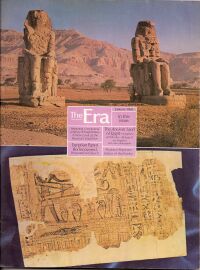
FAIR is a non-profit organization dedicated to providing well-documented answers to criticisms of the doctrine, practice, and history of The Church of Jesus Christ of Latter-day Saints.
| Answers portal |
| The Book of Abraham |
 |
|
FAQ:
Book of Abraham content: Production: |
|
Critics ask, "Why God would encourage Abraham & Sarah to lie in Abraham 2꞉24? Isn't lying a sin according to the 10 commandments? Why did God tell Abraham and Sarah to lie when 2 Nephi condemns liars to hell?"
The Bible tells us that Moses did what God told him to do. Is it so surprising that Abraham might have been told something similar to prevent death to the righteous? The Bible record tells us that God blessed Abraham despite his action. The Book of Abraham simply makes it clear that Abraham did not choose this path on his own, but like Moses was obeying a direct command from God, who may grant exceptions to His Laws if He pleases.
Critics fail to note that the Bible records Abraham's lie to Pharaoh, and then God rewards the lie (see Genesis 12꞉17). This seems a strange action if God disapproved their action.
Furthermore, there are times in the Bible and other extra-biblical accounts when God has commanded His prophets to protect the innocent by giving the wicked less than the whole story.
In the ancient Genesis Apocryphon text, Abraham has the same motives described in the Pearl of Great Price as delivered by Joseph Smith. He tells Sarah that God has given him a dream in which she saves him from being killed. He then tells her:
How did Joseph produce this authentic ancient detail, with this text not available until 1948?
The first example involves Pharaoh's murderous instructions to the Egyptian midwives:
The midwives are confronted with a command from the head of state which offends their personal/professional morality. They decline to participate, and actively deceive the Pharaoh--they even lie to him or his officers so that the deception may continue, as well as to (one assumes) spare themselves his punishment. The subsequent verses indicate God's approval of their action. (See Exodus 1:20).
Honesty to the wicked is not the primary moral value: obedience to the will of God is.
The second example comes from the prophetic call of Moses. The Lord speaks to Moses and says:
The Lord announces His intention to liberate the Israelites from slavery. But, in the very next breath, He tells Moses what to tell Pharaoh—what the "public story" should be, if you will:
The "public stance" of Moses and the Israelite leaders is to be that they only want to go three days' journey to sacrifice. So, here the Lord is advocating some degree of deception. This extends to even deceiving their Egyptian neighbors:
Because they are just going to make sacrifices, in the public version, the Israelites are to "borrow" valuable goods from the Egyptians. But, the true intent is clearly spelled out: they are to "spoil" (i.e. "loot") the Egyptians.
Pharaoh is, of course, nobody's fool. He seems to strongly suspect that there is more to the story than Moses is publicly admitting. He offers all sorts of compromise positions, seemingly designed to assure that the slaves will return after fulfilling their duties.
Things proceed to the point that Pharaoh threatens Moses' life despite the plagues and signs. The people are finally freed, but once they have left Pharaoh and his councilors decide to resort to violence and slaughter:
We are not told why the Lord instructed Moses to deal with the Egyptians in the way that he did. It is significant that Moses did not take such an approach on his own; only a direct command motivates his less-than-forthright behavior.
One can speculate, however—it is certainly reasonable to think that the Egyptians would have murderous intent toward their slaves who presumed to leave. They are willing to act on such inclinations, despite the plagues, when it becomes indisputable that Israel has left for good. If Moses had announced that Israel was leaving, what would the reaction of Pharaoh's court have been? Moses' failure to tell the whole story may well have saved Egyptian life, as well as Israelite. To be sure, God could have used another way. But, in this instance, deception was the specific tactic which He commanded.
Anti-Moses authors could doubtless exploit this situation to great rhetorical effect--they could mock Moses' "ethical lapse" here, and insist that he did it all for monetary gain. They could contrast his behavior here with the "thou shalt not covet," "thou shalt not bear false witness," and "thou shalt not steal" commands given later at Sinai, and point out that "borrowing" when you don't ever intend to come back looks a lot like "stealing."
==
FAIR is a non-profit organization dedicated to providing well-documented answers to criticisms of the doctrine, practice, and history of The Church of Jesus Christ of Latter-day Saints.
We are a volunteer organization. We invite you to give back.
Donate Now